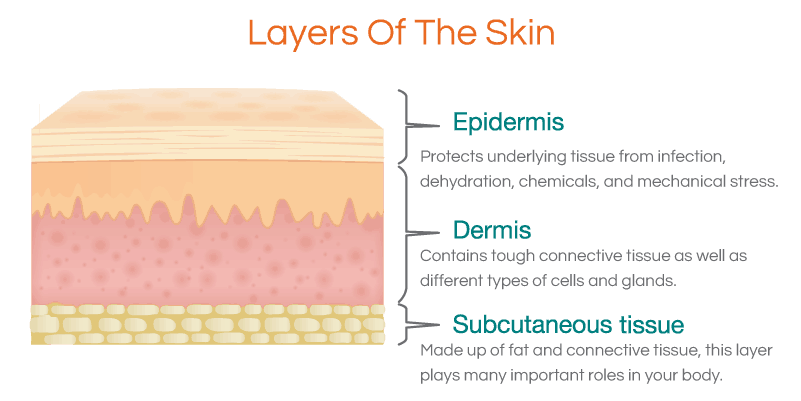Tattoos And Self-Tanner – The Essential Guide
Do you have a tattoo, or are you thinking about getting one, and wondering how it’s affected by self-tanning products?
Well, you certainly aren’t alone. In fact, this is a question I get all the time, so I thought it was about time that I answered all your questions about fake tan and tattoos.
First of all, before we really dive into this, you should know that for the most part, as long as your tattoos are properly healed, self-tanners are perfectly safe and won’t affect your tattoo.
However, there are certainly some other things you should think about, so let’s get into that a bit.

Does Self-Tanner Affect Tattoos?
As long as the tattoo is fully healed, self-tanning products absolutely won’t affect your tattoo.
This is one of the questions I get most often, and it’s a perfectly reasonable one.
However, let’s remember how self-tanning products work. The active ingredient in just about all quality self-tanning products, DHA, is responsible for tanning in most self-tanning products.
When DHA comes into contact with the amino acids in skin cells, it triggers a chemical reaction that results in pigment formation.
This pigment resides in the outer layer of your skin, known as the epidermis, which is the layer that gradually sheds over time.
Why exfoliation and moisturizing are crucial steps before spray tanning or self-tanning.
This is also the same reason that this product won’t harm your tattoo.
Tattoos are relatively permanent because they are injected through a needle, past the epidermis to the dermis, or the second layer of the skin (see the image below).
The needle that injects the ink slightly harms the body, causing a reaction as white blood cells attempt to absorb the pigment and move it through the bloodstream.

However, the pigment in tattoo ink is specifically designed to be too large for the white blood cells to dispose of, so it remains in the dermis, making it essentially permanent.
Since self-tanner only affects the upper layer of the skin, it can in no way affect the longevity of your tattoo.
Does Self-Tanner Make Tattoos Darker?
If your tattoo is a bit older (and therefore lighter in color) or just not a very dark color, it may appear slightly darker when you apply self-tanner or a spray tan.
Following our previous section, this should be clear.
The tattoo ink is essentially just living right below the outer layer of your skin.
When you tan or self-tan, you are essentially applying a slightly darker filter to your entire body, including your tattoo.
So, the answer is yes, it will likely make your tattoo appear slightly darker.
Is there any way to prevent spray tan from darkening your tattoo?
There are a few ways you can do this, actually!
First of all, remember that the tanning process takes some time to complete. So, as soon as you get home from your spray tan, you can take a damp towel and carefully rub the product off your tattoo.
This will prevent the tan from further developing on your tattoo.
The other option is to ask your airbrusher to apply a light coat of barrier cream to your tattoo. This prevents the self-tanner from reacting with your skin.
Can You Get a Tattoo with Self-Tanner On?
There are a few things you should consider.
First of all, you can absolutely get a tattoo after using self-tanner or getting a spray tan, and likely nothing will happen.
It is possible that it could increase your chances of getting an infection or cause an allergic reaction.
Both of these would likely be caused by some of the self-tanner being pushed into the lower layer of your skin by the tattoo needle.
However, any competent tattoo artist will clean your arm with an alcohol solution prior to giving you the tattoo anyway, so this is unlikely to happen.
The more important takeaway is, why would you want to use self-tanner the day before getting your tattoo?
It is commonly recommended that you keep your skin clear for up to a week before your tattoo appointment — including tattoos, makeup, and harsh exfoliants.
Although you can use self-tanner before getting a tattoo, it’s best to avoid it if possible.
Can I Apply Fake Tan to a Week-Old Tattoo?
This kind of depends on the person and the tattoo.

However, in general, you need to remember that a brand-new tattoo is really no different than an open wound on your skin, and that is how you need to treat it.
You should not apply anything to it other than your aftercare products, water, or a specific sunscreen intended for tattoos.
You should also be cautious not to expose your tattoo to excessive sunlight or submerge it completely in water.
However, I am not providing advice in this article on aftercare for your tattoo; for that, you should consult your specific artist.
Generally, it is best to avoid applying self-tanner, a spray tan, or similar products to a new tattoo until it has fully healed.
This means until after the final peel. For most people, this is at least a month, possibly two. Many tattoo artists won’t add to a tattoo until at least 2–3 months have gone by for this exact reason.
You can certainly apply self-tanner to the rest of your body, but be cautious not to apply it to your new tattoo.
You want to protect this skin both for your health and the health of the tattoo.
If you choose to tan your skin in the month or two after getting a tattoo, you should cover it.
Whether this is in the sun or in a tanning bed (neither of which I recommend), you should cover it. Your tattoo was an investment in yourself, and it’s worth taking precautions to protect it.
If you decide to tan in the sun or use a tanning bed, even after your tattoo has healed, be aware that UV rays will cause your tan to fade.
To prevent this, use sunscreen to protect your skin.
Related Articles
Tanning 101: How Do Self-Tanners Work?







